The Daily Agenda: Tucson's holiday season back in 1923
Tucsonans were getting ready for the holidays a century ago ... While the world kept on turning ... Will Bronson's replacement move the board leftward?
Welcome back to 1923! Just like we did for Thanksgiving, we’re using newspapers.com to take you back 100 years to see how much has changed in Tucson, and how much hasn’t.
As Tucsonans shopped for presents and planned Christmas dinner back in December 1923, many of them wanted to know what the weather was like “back home.”
Just like today, many Tucsonans had moved here from other states and still had family there. But they couldn’t go to the National Weather Service’s website to see if they needed to check on their grandparents or if the time was right to rib their snow-shoveling siblings with photos of Tucson’s clear, blue sky.
So who did they turn to? The Chamber of Commerce. Tucsonans pestered chamber officials every day with questions about “what the weather man is doing” in their home states. Chamber officials finally arranged for Tucson to get daily weather reports from the “principal cities” throughout the country, which the Arizona Daily Star and Tucson Citizen could publish.
It’s hard to imagine anybody today would ask the Chamber of Commerce about the weather. But it’s just one of the many ways the chamber was seen as an essential pillar of the community, along with groups like the Boy Scouts or the Elks Club.
Those organizations are still around, but their place in society has changed dramatically. When was the last time you read about how the Boy Scouts chose their executive director? A Tucsonan in 1923 would have heard all about it.
Want to know another thing that’s hard to imagine? An annual contest to see who has the best lawn in Tucson. That was the goal of the Kiwanis Club’s “Better Winter Lawn” contest. It was a big deal and merited a lot of news coverage as judges were selected and the awards ceremony was scheduled.
But a lot of what was happening in Tucson back then is recognizable today.
The Tucson City Council was busy approving plans to pave Speedway and South Sixth Avenue for the first time. They also were considering a request from local merchant Harold Steinfeld for an ordinance to relieve traffic congestion on Pennington, between Stone and Church. (He suggested an ordinance similar to the one on Congress and Stone, where cars could only be parked for one hour.)
The produce industry that drives the economy in Nogales was becoming the multi-billion dollar business it is now. Importers touted a massive crop of tomatoes grown in Sinaloa, Mexico, including 2,500 train cars of tomatoes headed to Nogales and then on to East Coast cities.
And just like today, the national pastime of making fun of legislators was in full swing.
Editorial writers agreed with Arizona Gov. George W. P. Hunt’s decision not to call the state Legislature back into session, saying "an orgy of oratory with nothing accomplished is what the state might expect for its money spent in special session of the legislature.”
A U.S. representative from Florida said Congress members should get sofas in their offices, prompting a tongue-in-cheek endorsement from editorial writers. “Members of Congress, like babies, are least trouble when they are asleep.”
Immigration was a hot-button issue, but it wasn’t the same situation that the nation is watching on the Arizona-Mexico border today as thousands of migrants and asylum seekers arrive every week.
Back in 1923, a so-called “gigantic plot to smuggle aliens into this country” was unfolding in upstate New York. Federal agents looking for bootleggers on the Canadian border caught 50 people crossing the border. Most of them were Irish, English and Swedish. They couldn’t enter legally because the immigration quotas for the year had already been filled.
Back in Tucson, police caught a German man who couldn’t speak a word of English at Sixth and Toole avenues. He was suspected of entering the United States from Mexico “in an irregular manner.”
Amid reports of Tucson police looking for the youngsters who threw eggs at cars and the announcement by famous automaker Henry Ford that he wouldn’t run against President Calvin Coolidge, a chilling incident popped up a few times in local papers that would eventually surpass every other news item in importance.
German authorities had arrested Adolf Hitler after he led the beer hall putsch in November. He tried to install a fascist regime in Bavaria, with an eye on taking over the country as a whole. He failed and in early 1924 he was sentenced to prison, where he said he intended to write a book.
News accounts said Hitler could work his followers into a frenzy, but it wasn’t enough to lay a solid foundation for a political movement. After his arrest, that fanaticism posed a challenge for the people guarding him: Who could be trusted to guard him without succumbing to his maniacal personality?
”Everyone who has had the Bavarian fascist leader under close observation agrees that he radiates a personal influence that is almost hypnotic,” the Star reported.
“If you are hostile to his purpose,” one military man said to the correspondent, “you feel physically exhausted after resisting his talk. He takes control of the conversation from the instant it begins and never lets up. We dare not try him by jury.”
But Hitler’s atrocities were still far beyond the horizon and Tucsonans were busy counting down the days until Christmas.
University of Arizona President Cloyd H. Marvin hosted a Christmas breakfast for 136 students who didn’t go home for the holidays. Two Rhodes Scholars from Tucson wrote letters about how they were spending the holidays in Oxford, England.
Tucsonans were proud that they were one of the few cities in Arizona where people sang carols in the street. Advertisers bombarded local newspapers with deals on candles, slippers, perfumes, stationery, you name it.
A columnist went window shopping downtown and marveled at “silverware and articles of jewelry in the Congress street jewelry stores and at Steinfeld’s that makes a chap think of Tiffany’s, Fifth avenue, N.Y.” All in a city that many easterners wrongly imagined as a “cross between a cow town and a mining camp.”
We’ll leave you here, dear reader, with visions of leisurely window shopping on Congress. Not a bad way to spend your time, even today.
Happy holidays, everybody!
Big consumers: A new study from the Arizona Department of Water Resources shows that groundwater supplies are declining rapidly in five farming-dominated basins across the state where pumping isn’t regulated, including Cochise County, the Arizona Daily Star’s Tony Davis writes. The five areas use about the same amount of water each year as Phoenix and Tucson combined, with the study projecting that the fragile aquifers are likely to lose water at an even faster pace over the next 50 years.
No charges coming: The Pima County Attorney’s Office will not be pursuing charges against corrections officers at the Pima County jail in connection with a man who died last August after he was repeatedly tased, the Tucson Sentinel’s Paul Ingram reports. Pima County Attorney Laura Conover said Thursday that between the multiple causes of death listed on Wade Welch’s autopsy and his “continued refusal to comply” with corrections officers, her office did not believe there was a substantial likelihood of conviction.
Mapping the future: Arizona’s Republican state senators outlined their plan for the 2024 legislative session, including increasing support for law enforcement, championing water management solutions, blocking any attempts by Hobbs to increase the size of the government, advancing election transparency and more.
Funding safer streets: The Prop 411 Neighborhood Mini-grant program we wrote about in October launched last week, offering community members the chance to champion projects to address speeding and improve livability in their neighborhoods, Tucson City Councilman Paul Cunningham wrote in the latest edition of his newsletter. The grants will fund traffic calming projects that use physical features to reduce risk, change driver behavior and make roads safer for cyclists and pedestrians.
Relief on the way: Gov. Katie Hobbs is sending more than 240 Arizona National Guard members to the U.S.- Mexico border to help with enforcement, including fentanyl interdiction and increased migrant crossings, Arizona Public Media’s Danyelle Khmara reports. Hobbs signed an executive order Friday sending the troops to multiple locations along the border, including near the Lukeville port of entry and at the San Miguel crossing, both of which have been experiencing increased migrant crossings.
A pivotal choice: Pima County Supervisors will soon be picking a replacement for Sharon Bronson, which brings the potential for a leftward drift, the Star’s Tim Steller writes. Bronson must be replaced by a Democrat, since that’s her party affiliation, but Bronson’s rightward drift in recent years made her the second most conservative board member, Steller said. The board could potentially pick a Democrat that would create a new progressive majority for the next several years, making the supervisors look a lot more like the all-Democratic Tucson City Council.
6,000: The number of people who owned cars in Pima County in 1923, the Star reported Dec. 19 of that year.





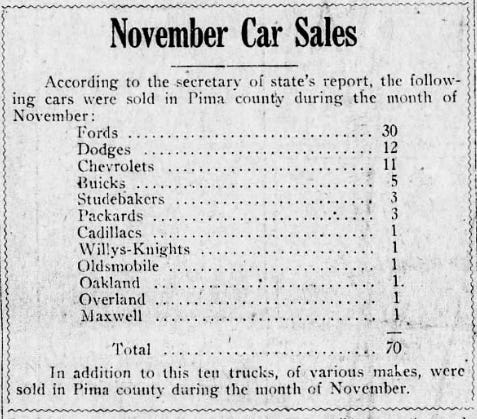
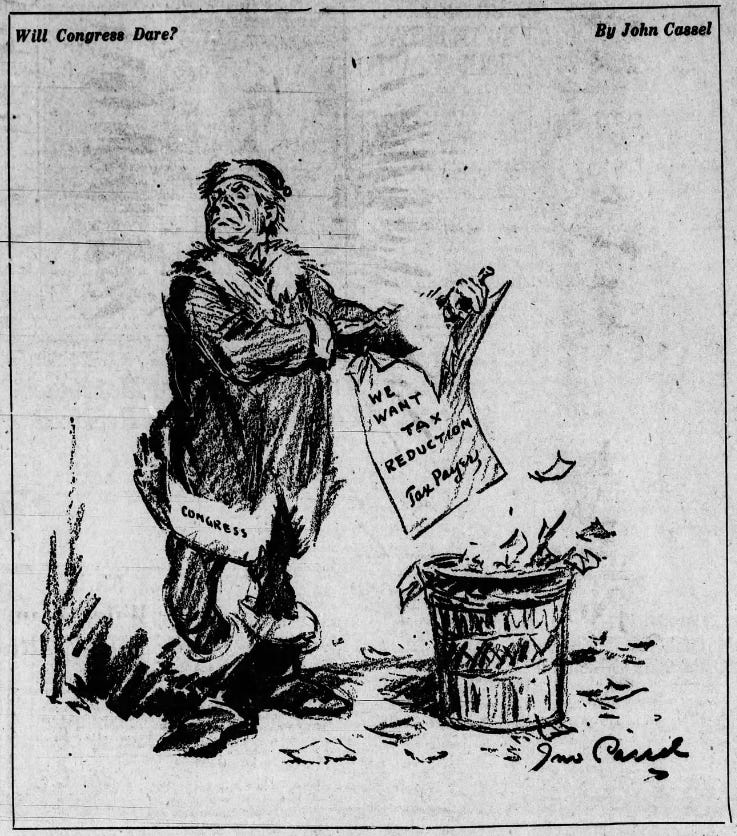
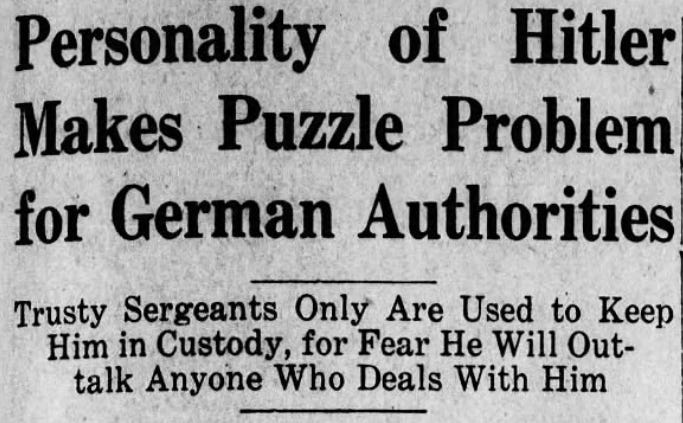
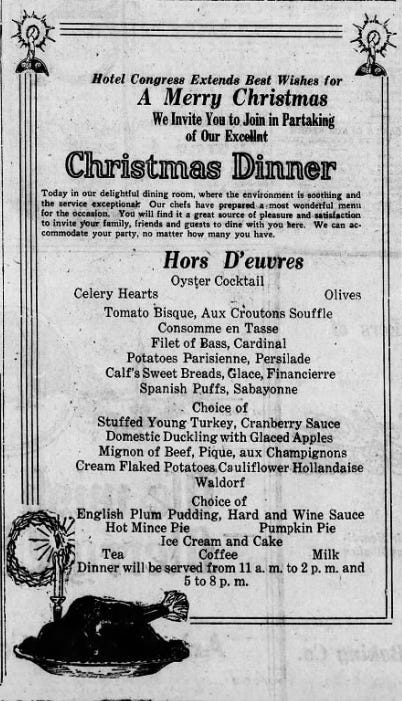
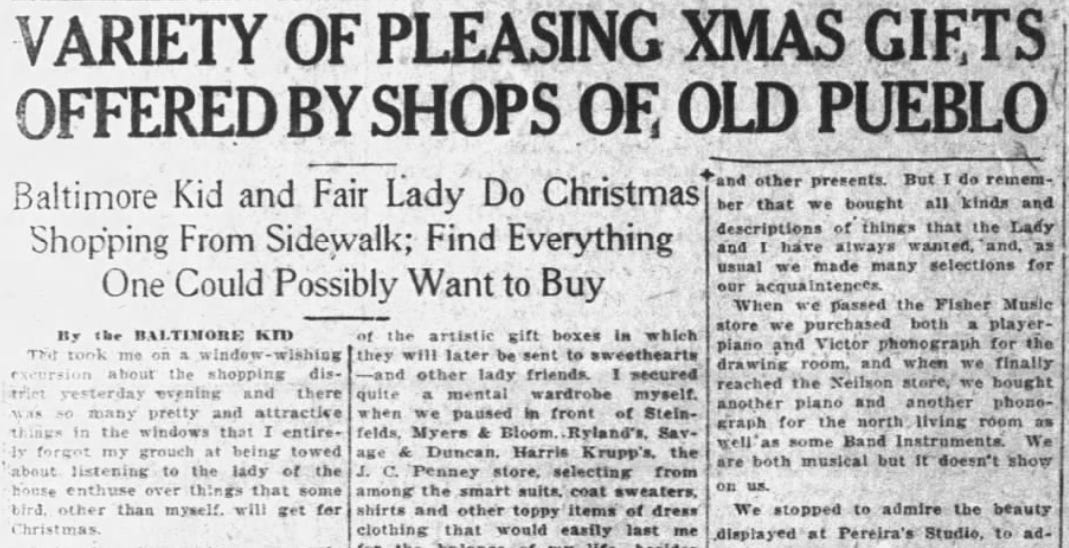


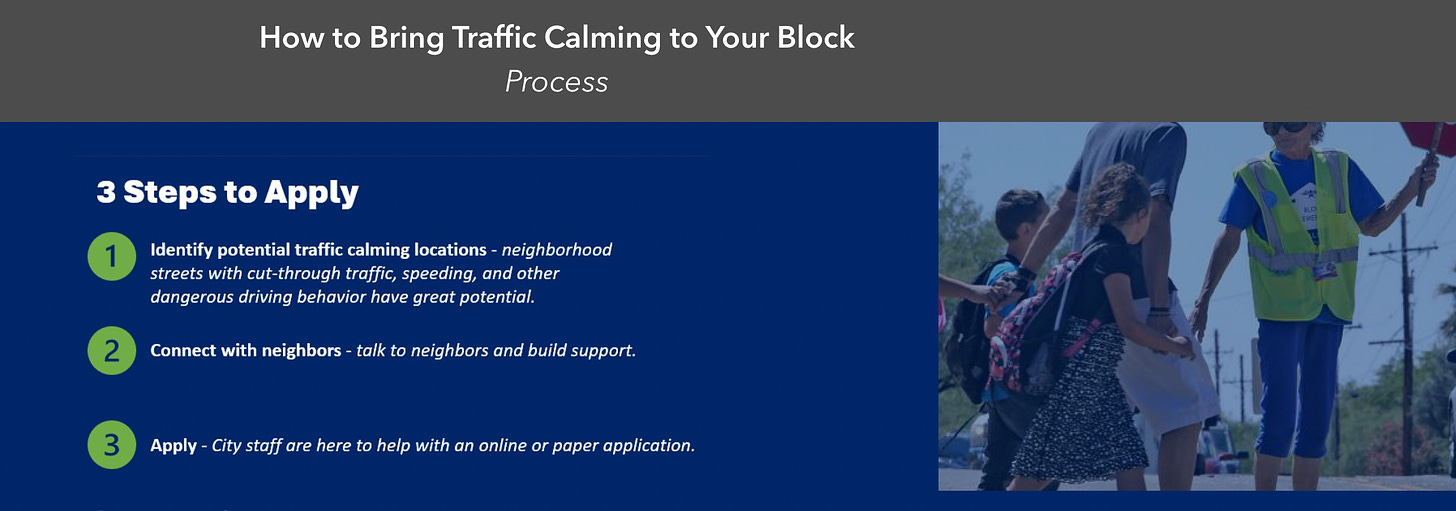

Can you please put your letters to the editor in a separate .. . file or someplace easily to access? I've seen one set of letters - a week or so ago - nothing since. Thanks! sara
Love the 100 year look back.